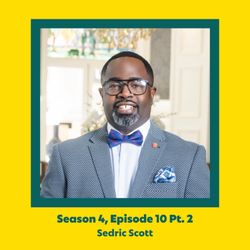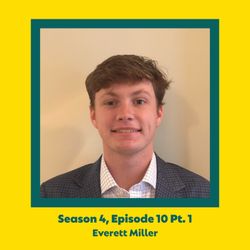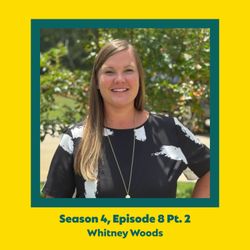Latest episode

10.5. Sedric Scott: Greek Life
16:34||Season 4, Ep. 10.5On today's episode, Sedric Scott discusses fraternity and sorority life at the University of Mississippi. He also talks about the efforts that the UM Panhellenic are making towards educating greek life. "We try to encourage all of our greek life. We always tell the chapter presidents, 'You have to be patient with yourself, you can't be comparing yourself to these other chapters on campus. You've got to do what you can do with what you've got.'"Listen to this episode on Spotify, Apple Podcasts, or any other major streaming platform. For video versions of each episode, watch us on YouTube. If you or someone you know is struggling with a mental health or substance-use disorder, please contact SAMHSA's National helpline at (800) 662-4357. These programs provide free, confidential support 24/7.All recordings are from the previous school semester, so some information about the interviewee may be out of date.
More episodes
View all episodes

10. Everett Miller: Support
20:30||Season 4, Ep. 10On today’s episode, Everett Miller shares his experience with grief and the support systems that he leans on during difficult times. He also talks about his experience at Sigma Chi when the late Thomas Mayo passed, discussing how it affected the trajectory of their fraternity's initiatives and attitude towards supporting each other."It was tough for me, I remember that when I found out I called my parents and there were more questions than looking for comfort: 'Why did this happen and why did it happen to someone as great as Thomas?'. It was a tough day for all of us, whether you knew him personally or just knew his name."Listen to this episode on Spotify, Apple Podcasts, or any other major streaming platform. For video versions of each episode, watch us on YouTube.If you or someone you know is struggling with a mental health or substance-use disorder, please contact SAMHSA's National Helpline at (800) 662-4357. These programs provide free, confidential support 24/7.All recordings are from the previous school semester, so some information about the interviewee may be out of date.
9.5. Liz Norell: We're Overwhelmed
24:39||Season 4, Ep. 9.5On today's episode, Liz Norell discusses today's culture of productivity and how it can lead to being easily overwhelmed in our daily lives. She also talks about potential solutions to these problems."If we can start looking at people with the assumption that what they're doing is the best that they can do, and that whatever they're doing is not about me, then we can have a radically different world."Listen to this episode on Spotify, Apple Podcasts, or any other major streaming platform. For video versions of each episode, watch us on YouTube.If you or someone you know is struggling with a mental health or substance-use disorder, please contact SAMHSA's National helpline at (800) 662-4357. These programs provide free, confidential support 24/7.All recordings are from the previous school semester, so some information about the interviewee may be out of date.
9. James Polk: Pressure
18:19||Season 4, Ep. 9On today’s episode, James Polk shares his experience with pressure and how it showed itself as he navigated college life. He talks about how he was able to spot it and handle it accordingly both while being a student and president of the columns society at Ole Miss."I didn't know how much went on behind the scenes."Listen to this episode on Spotify, Apple Podcasts, or any other major streaming platform. For video versions of each episode, watch us on YouTube.If you or someone you know is struggling with a mental health or substance-use disorder, please contact SAMHSA's National Helpline at (800) 662-4357. These programs provide free, confidential support 24/7.All recordings are from the previous school semester, so some information about the interviewee may be out of date.
8.5. Whitney Woods: Authentically You
38:55||Season 4, Ep. 8.5On today's episode, Whitney Woods discusses the college student experience from her lens as the Assistant Director of the Office of National Scholarship Advisement. She talks about common themes that she sees in the students and how their office works to help set their students up for success."We are giving them tools that they'll need beyond a national scholarship."Listen to this episode on Spotify, Apple Podcasts, or any other major streaming platform. For video versions of each episode, watch us on YouTube.Due to a loss of footage, Whitney Woods' episode is audio only.If you or someone you know is struggling with a mental health or substance-use disorder, please contact SAMHSA's National helpline at (800) 662-4357. These programs provide free, confidential support 24/7.All recordings are from the previous school semester, so some information about the interviewee may be out of date.
8. Madeline Mueller: Imposter Syndrome
22:39||Season 4, Ep. 8On today’s episode, Madeline Mueller shares her experience with imposter syndrome and how it affected her through college. She talks about how she has handled it in the past and how she works to combat those thoughts today."I've definitely gotten better about trying to adjust my thinking, but I feel like these 'what-ifs' start creeping in so its like 'what if I'm not the most qualified for this role', 'what if someone could be doing it better', 'what if I am in this role and people don't like me'."Listen to this episode on Spotify, Apple Podcasts, or any other major streaming platform. For video versions of each episode, watch us on YouTube.If you or someone you know is struggling with a mental health or substance-use disorder, please contact SAMHSA's National Helpline at (800) 662-4357. These programs provide free, confidential support 24/7.All recordings are from the previous school semester, so some information about the interviewee may be out of date.
7.5. Dr. Ashley Jones: Pushing for Change
43:51||Season 4, Ep. 7.5On today's episode, Dr. Ashley Jones discusses common themes that she sees in minority groups and how she and others are working to change these themes."Growing up nearby, you always have this perception what the University is and what its image is and I'm actually grateful that was not the case."Listen to this episode on Spotify, Apple Podcasts, or any other major streaming platform. For video versions of each episode, watch us on YouTube.If you or someone you know is struggling with a mental health or substance-use disorder, please contact SAMHSA's National helpline at (800) 662-4357. These programs provide free, confidential support 24/7.All recordings are from the previous school semester, so some information about the interviewee may be out of date.
